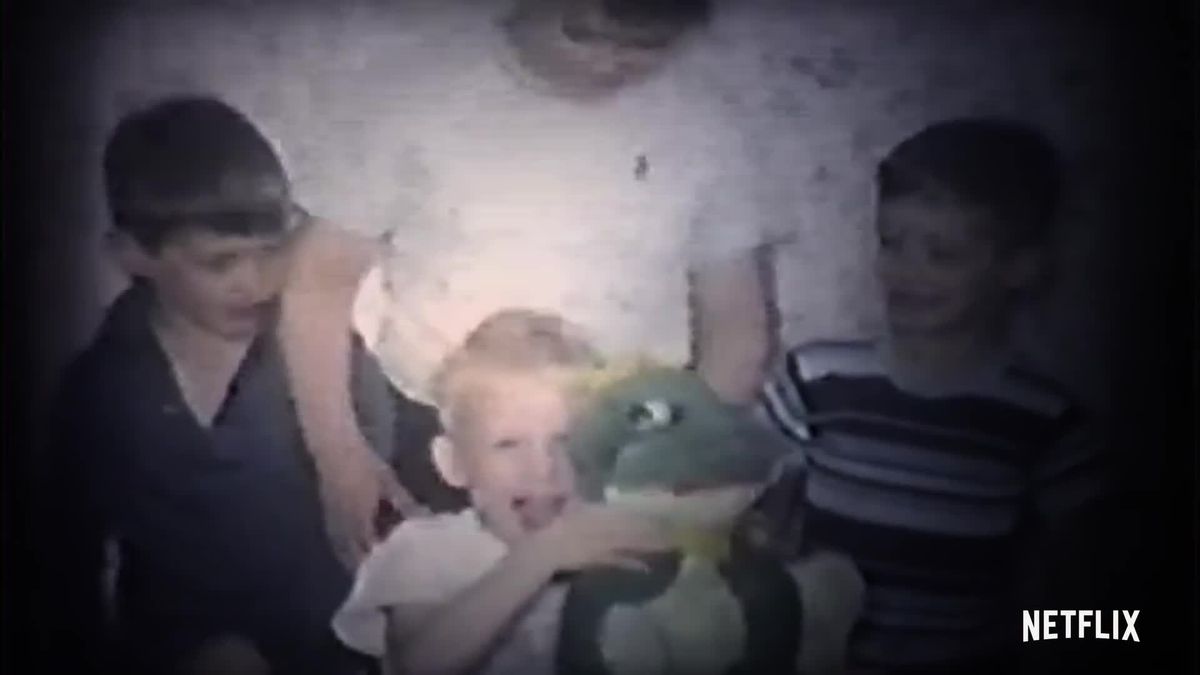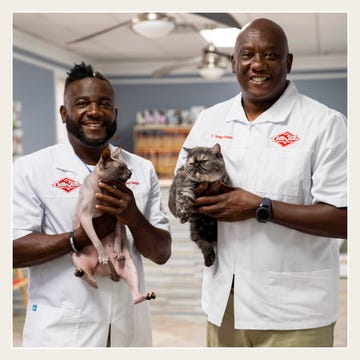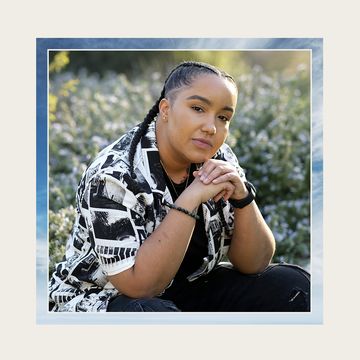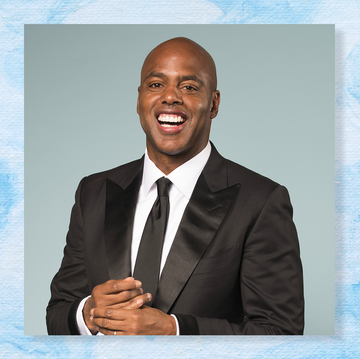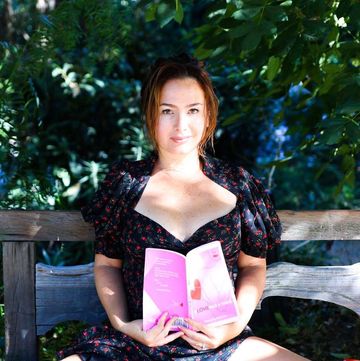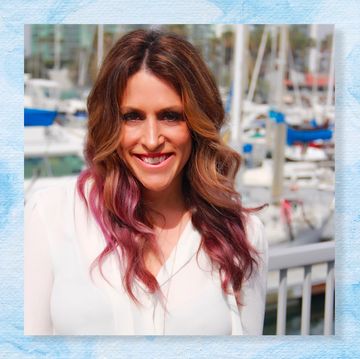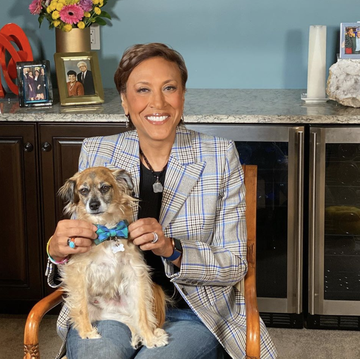A Kenyan safari guide. A Hollywood costume designer. A world-traveling sommelier. In this series, we learn about the journeys people take to land the ultimate Dream Jobs.
Erin Moriarty’s average day involves talking to convicted killers, victims’ families, lawyers, and law enforcement. She's reported from the war in Iraq, and once gave a notorious serial killer her home address for a story (more on that later). As a true-crime journalist, Moriarty has devoted her unwavering curiosity to probing cold cases and re-examining murder convictions on 48 Hours since 1990. So it may surprise you to learn that she never planned to be on TV in the first place.
“All I ever wanted to do was be a litigator,” the nine-time Emmy Award winner tells OprahMag.com. “That was my plan, and staying in Ohio.”
Moriarty’s path to becoming the veteran journalist she is today did begin back in Ohio, where she was born and raised. After earning a degree in behavioral sciences and a subsequent law degree at Ohio State University, Moriarty practiced law for two years. But it didn’t take long for her to notice the glass ceiling looming over her career.
“I was the only woman in the law firm, and the only way you were ever going to make money was by rainmaking—getting clients,” she says. “It’s the Midwest. It’s the late '70s, early '80s. Even the clubs where the lawyers would take their clients, women weren’t allowed to join. I would have had to go with a guy.”
So she got creative. It occurred to Moriarty that TV appearances would be one way to get her name out to prospective clients in Columbus, and soon learned that a (now-defunct) broadcasting company was planning a new syndicated program to hit test markets in cities including her own. “They thought it was so weird that a young female lawyer auditioned, that they actually gave me the job.”
The gig turned out to be a match for Moriarty’s skill set in ways she hadn’t imagined. “It was perfect. I could cover legal issues,” she says. “And as time went on, I realized I could even change the system, or at least inform people about the system, better from the outside than the inside.” She admits that her novelty actually became an asset in the early 1980s. "Now, you’ll see all these female lawyers on Fox, but at that time, I stood out a bit.” Getting the assignments she wanted was far harder, though, which is how she learned to become—to use a phrase Moriarty invokes several times in our conversation—“a wall of sound.”
“When I first started, I was general assignment, and they would assign me to the quote-unquote ‘female’ topics, when I wanted to cover legal and consumer issues,” she says. Moriarty’s persistence in fighting for more investigative stories she believed in wasn’t always well-received, but it did prove effective. “I would become a wall of sound, and be such a pain in the butt that it was just easier to let me do the stories I wanted to do than hear me.”
Over the next few years, Moriarty took reporting jobs at TV stations in Baltimore, Cleveland, and Chicago. Then she set her laser-like focus on getting a job at CBS News. In a classic case of if-you-see-it you-can-be-it, she already knew the network had put more women in front of the camera than ABC or NBC did, including now broadcast legends Lesley Stahl, Connie Chung, and Diane Sawyer. Moriarty joined CBS News in 1986, and started at 48 Hours two years later.
America’s seemingly bottomless appetite for true crime showed no signs of flagging in 2019, and the widespread fervor’s been at its strongest for five years now. At the dawn of an era that’s produced more media than any one person could consume in a lifetime—2014-2015, respectively–Serial season 1 and Netflix’s Making a Murderer both managed to grab a wide cross-section of fans who would dissect the cases’ tiniest details around office water coolers and via social media and Reddit threads. True-crime podcasts further widened the parameters of whose stories get told, and the many ways people can tell them. iTunes’ weekly podcast charts reflect a varied taste for all manner of macabre storytelling these days, from the slickly-produced Dirty John to chattier formats that essentially recap reported articles they read (at times without crediting the original journalist).
But long before all of that, series like 48 Hours—a pillar of the genre affectionally dubbed “murder shows” by its largely female fandom—set the conventions of true-crime entertainment so future creators could experiment. Moriarty says one of her favorite things about being a 48 Hours correspondent is the time and resources she’s given to get the best story, increasingly rare in a shifting news landscape that’s become more about tight budgets and quick turnaround. One topic she's passionate about drawing attention to: Wrongful conviction.
“We’re realizing there’s so many reasons why people are wrongfully convicted,” Moriarty says. “Even though I can’t focus entirely on those stories, I’m allowed to stay on them, and they take years sometimes.” The same warm curiosity that’s evident when she interviews subjects on the show seems to drive Moriarty though the months of legwork alongside her producers: “Why do people get convicted for something they didn’t do? Why do people confess to things they didn’t do? And that’s one of the biggest reasons why I’ve stayed at 48 Hours. Because I have the perfect job.”
Moriarty is particularly proud of her show’s impact on the exoneration of Ryan Ferguson, whose 40-year sentence for the murder of Missouri sports writer Kent Heitholt was vacated in 2013. Though the 20-year-old Ferguson didn’t know Heitholt and there was no physical evidence, his friend Charles Erickson told police they’d committed the crime after he dreamed they’d done it (Erickson has since recanted his confession).
Moriarty first covered Ferguson’s trial, and his 2005 conviction shocked her. “So we stayed on the story,” she says. 48 Hours was the first national outlet to follow the case, and they kept in touch with Ferguson’s family and his legal team over seven years. “We did five reports, and every time, new evidence would come out. A new lawyer got involved, and really took the case. And ten years later, we were there when he walked out.”
“I almost know, almost certainly, that if you had not covered the trial, a lot of the facts would still remain probably hidden,” Ferguson told Moriarty in a 2013 48 Hours interview.
The scariest place Moriarty’s work has taken her? A room with Dennis Rader, aka the BTK Killer (whose story is told in seasons 1 and 2 of Netflix’s Mindhunter), for an interview that was never recorded. “He didn’t cry at all when we talked about how he tortured these women, but he cried because his daughter wasn’t speaking to him,” she remembers. In pursuing a possible segment, Moriarty wanted to use some of Rader’s original artwork. “But he would only give it to me if I gave him my home address, and I did,” she says—a choice that (understandably) horrified her son.
“At the time I told him, 'Honey, he’s never getting out.' And my son said, 'But how do you not know he’s gonna give our address to someone else?' Which was a very good point! Not one of my better moments,” she laughs.
In June 2019, Moriarty—who’s reported for CBS News on everything from the death of Princess Diana to the 1995 Oklahoma City bombings to the mass shooting in Newtown, Connecticut—received a Lifetime Achievement Award from the Alliance for Women in Media Foundation. “My colleagues were all joking with me like, 'Don’t worry Erin, we know you’re not done.' And when I picked a dress, I tried to pick a dress that said, 'I’m not done.' Her latest chapter: A foray into the podcast game herself. My Life of Crime, released weekly, is a more personal and less formal look at the true crime stories she's worked on.
Moriarty is the first to acknowledge that the media landscape is vastly different in 2020 than it was when she started out in a four-news-network world. “You have to really want it today, because it is tougher,” she says. “On the other hand, there are far more opportunities.” Networking is more important than ever—she can’t recommend seeking out a mentor enough—and “you have to be a good writer. To me, one of the most important skills you have to have is the ability to write quickly, clearly, and visually. But passion’s probably the most important thing.”
She warns against getting into TV reporting for the glory, as that’ll inevitably disappoint. “Always enjoy where you are at that moment, because you can’t always be in a hurry for the future,” she adds. “You really have to enjoy where you are at the time.”
For more stories like this, sign up for our newsletter.

Samantha Vincenty is the former senior staff writer at Oprah Daily.

